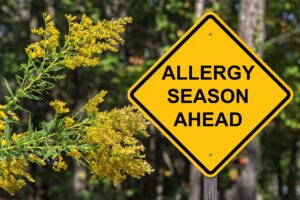
Spring is finally here which means the birds, bees, and blossoms are starting to flourish. Although many people enjoy longer, sunnier days, others might try to avoid being outdoors. All the extra pollen this time of year can wreak havoc if you suffer from allergies. While you already know how this can affect your eyes or nose, did you know that it can impact your dental health, too? Keep reading to learn 3 ways that allergies can influence your oral well-being and what you can do to prevent dental problems!
Issue #1: Dry Mouth
Saliva is your body’s natural defense against dental issues because it rinses away unwanted food particles and bacteria throughout the day. When your mouth isn’t as moist, these germs can flourish and contribute to certain conditions like cavities, gum disease, and bad breath. Unfortunately, antihistamines used to treat allergies are known to cause dry mouth which won’t help your teeth. Plus, if your nose is stuffy then you’re forced to breathe through your mouth, which only exacerbates this dilemma.
The good news is that there are a few simple things you can do to prevent dry mouth, such as:
- Drinking more water. This will hydrate your body and rinse away harmful microbes before they have a chance to thrive.
- Chewing sugar-free gum. The act of chewing stimulates saliva production and since there’s no sugar, you’re at less risk of developing tooth decay.
- Sleeping with a humidifier. The combination of sleeping with your mouth open and naturally reduced saliva production at night can leave your mouth parched. Sleeping with a humidifier ensures that the air you’re breathing has more moisture.
Issue #2: Toothaches
When you have an allergic reaction, your sinus cavities fill with mucus which can cause a stuffy nose, headaches, and throbbing teeth. This increased pressure in your sinuses is known to press against the roots of your molars which can cause discomfort as well as sensitivity to hot and cold temperatures. You may even notice that the pain gets worse when you change positions from standing to sitting or lying down.
If you’re not sure whether allergies are the culprit behind your sore mouth, try taking antihistamines. If taking these medications doesn’t help, then it could be due to something else, like tooth decay. Call your dentist so that they can examine your mouth to ensure everything is in good condition.
Issue #3: Bad Breath
Another common symptom of allergies is postnasal drip. As mucus runs down your throat, you can develop a cough and inflammation that causes a sore throat. Not only that, but it carries harmful bacteria that can cause halitosis, also known as bad breath. Drinking more water can help rinse away the toxic germs and taking allergy medications can inhibit your body’s response so it becomes less of a concern.
It’s important to address your allergies to protect your teeth and gums this spring. If over-the-counter solutions aren’t making a difference, call your doctor for some much-needed relief that can help preserve your smile!
About the Author
Dr. Marc Moulton has more than 30 years of experience helping patients enhance the quality of their daily lives by improving their oral health. He earned his undergraduate degree at Emory University and then was awarded his Doctor of Dental Medicine by the University of Alabama at Birmingham School of Dentistry. Since then, he has stayed on top of recent developments in dental technology and techniques with ongoing educational opportunities. His practice is equipped with state-of-the-art equipment to quickly identify problem areas and provide fully individualized solutions to address them. If you’re concerned that your allergies have harmed your smile, you’re welcome to request an appointment on the website or by calling (205) 988-3360.
